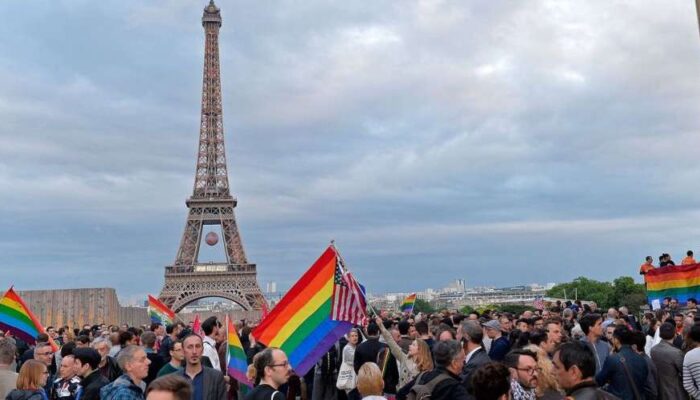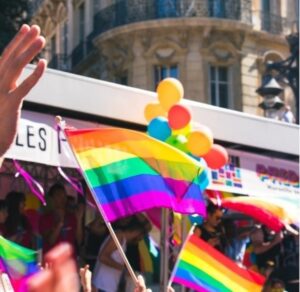“We are the ‘Asylum Seekers’”: The ‘Joyful Migration’ of Indonesian Gay Men in Paris
I was going to Marseille, France in 2010 to do my doctoral degree. I was conducting research about migration and family relationships through the cases of Indonesian gay men. While I was in the airplane from Jakarta to Paris, I thought about my respondents and why they migrate to Paris and whether they will accept me. I had to think positively as I am also gay and hoped that my interviews with my respondents would go well. My plane landed smoothly in Charles de Gaulle Airport, and I had to go to Marseille by train. After one month living in Marseille, I contacted my gatekeeper, who acted as an intermediary between myself and potential research participants, to make an appointment. He was very friendly and kind. He was also a Indonesian gay man who has lived in Paris for ten years. He gave me the names, contact numbers and email addresses of twenty Indonesian gay men to communicate with. From there my experiences began. I do not want to tell the experiences of all my respondents. I just want to talk about one respondent who had beautiful experiences.
As we become more attuned to contemporary reasons for international migration, our imagination also opens to the processes of migration itself. I met 36-year-old Hanto (not his real name) in a coffee shop near his apartment. We chatted and he said “before I was an asylum seeker”. Now he has already changed his nationality into French. He has a French husband. He told me:
“I used to seek asylum in Europe. I was in Amsterdam for one and a half years but I don’t know exactly why I fall in love with Paris. Indonesia is still my country. I still love Indonesia because I was born there. But Indonesia is not able to change the policies to LGBT people so I was forced to give up my citizenship. My families in Indonesia also know that I am gay and they can’t do anything. They said to me that if I want to change my nationality it’s up to me. And now I am French. But I will never forget my country, my parents, my two little sisters, and also my families. I return to Jakarta at least at the moment of ‘Lebaran’. If I can’t, I return to Indonesia as I like.”
He said that before leaving for France, the idea of Paris conjured up images of the Eiffel Tower. He believes that students and other people who come to France, always imagine the Eiffel Tower. By linking Paris as a place of attachment, I saw that Paris in this case can be indicated as their home. Therefore they have a sense of ‘feeling at home’ as they are comfortable living in Paris.
The question of belonging indicates that when people feel marginalized or threatened, they begin to see other places where they can feel the freedom to express their sexual orientation. In the sense of ‘feeling at home’, they have done a lot of activities related to their gayness. Hanto said that Paris is very comfortable and life is dynamic there. Gay life is also very lively. Paris is a gay-friendly city in Europe and there are freedoms in Paris. In this case, the notion of freedom is a very strong component of the imaginary. With freedom, they feel that Paris has become their own home. Another activity they do in Paris is going to gay bars. The gay bars are simply places to express an identity.
Image Source: Inside Indonesia
Gay bars are seen as places of acceptance and are used as an escape from the dominant heteronormative culture. I asked Hanto the question “have you often gone to a gay bar?” Hanto answered that while he is not very close with Indonesian gay men, when he has some time to go to the gay bar,he goes out. The feeling of being at home can also be indicated by their participation in gay pride. We know that each year (generally in July or August) several European countries are animated with gay pride. Gay pride is organized to celebrate the freedom of sexual identity and to protest against homophobia. Hanto always goes to gay pride. He said to me that “gay pride is the way that gays can be open in public and at the same time it raises consciousness that gay people must be accepted by society”. He said with extreme severity that “homosexuality is not a disease and must be respected.”
The question of belonging indicates that when people feel marginalized or threatened, they begin to see other places where they can feel the freedom to express their sexual orientation.
One thing that was very interesting to me was my respondents’ opinion of PACS (Pacts Civil de Solidarité) because it can also be related to the Indonesian saying ‘Kumpul Kebo’. In general, the term ‘Kumpul Kebo’ can be understood to mean ‘cohabitation’. ‘Kumpul Kebo’ is generally used for couples who live together before officially getting married. Until recently this activity was considered illegal as it was viewed as damaging to social morals. Regarding PACS, Hanto explained that “PACS is a good policy for all couples either homosexual or heterosexual. With the existence of PACS, homosexual couples will benefit.” Hanto also said that with PACS, at least homosexual couples have equal rights to heterosexuals.
Regarding the improvement of life in the context of the study of contemporary migration, O’Reilly and Benson (2009) mentioned that this type of migration can be classified as ‘Lifestyle Migration’, which is defined as the spatial mobility of relatively affluent individuals of all ages, moving either part-time or full-time to places that are meaningful because, for various reasons, they offer the potential for better quality of life. In this case, the individual is trying to find good quality of life and freedom. O’Reilly and Benson (2009) also explained that Lifetsyle Migration is about escape – escape from somewhere and something.
Indonesian people do not openly discuss the subject of sexuality. A gay man must play hide and seek to hide his sexual identity. Playing hide and seek therefore becomes a cultural practice. As they wear a ‘mask’ (Oetomo, 2002), they appear as heterosexual men in order to protect themselves from contempt and ridicule. They must try to live like heterosexuals, because the consequence of coming out of the closet is very dangerous.
What is very interesting here is that they do not want to be known as “refugees”, but they prefer to be called an “asylum seeker”. According to UNHCR (2009) the definition of asylum seekers are individuals who have sought international protection and whose claims for refugee status have not yet been determined. Thus, individuals who seek international protection are called asylum seekers and all refugees are initially asylum seekers. An asylum seeker seeks shelter in a country outside of their country of origin, for a series of reasons like persecution, aggression, conflict, human rights abuses, threats to life, etc. (Arboleda & Hoy, 1998). For many Indonesian asylum seekers, the word “refugee” is used for those who come from conflict areas and countries, while for them, Indonesia is still a safe country.
Imagination plays an important role in influencing gay Indonesian refugees’ reasons for moving to Paris.
From the cases in my research, I discovered a new model of migration which I call ‘Joyful Migration’. This kind of migration can be defined as the displacement of people based on the imaginary of the beauty of the country where they will stay. Ultimately as soon as they have moved and settled in the country that they imagined, they normally feel happy. From the meaning of ’Joyful Migration’, we can analyze that for most gay men whose rights are not tolerated in their country of origin, they can see that life abroad for gay men can be very advanced. They receive news from friends who are also gay and read online that the country they want to go to is very tolerant of their sexual orientation. They painstakingly apply to study or work there, or they are desperate to make the journey with only what they have. For those who study or work, this is not a problem, but for those who go to the destination country without any expertise, this can present a problem.
We can see that imagination plays an important role in influencing gay Indonesian refugees’ reasons for moving to Paris. They imagine that Paris is a gay-friendly city and thus, the motivation to come out of the closet is gradually reinforced as they are exposed to greater diversity of sexual identity.

